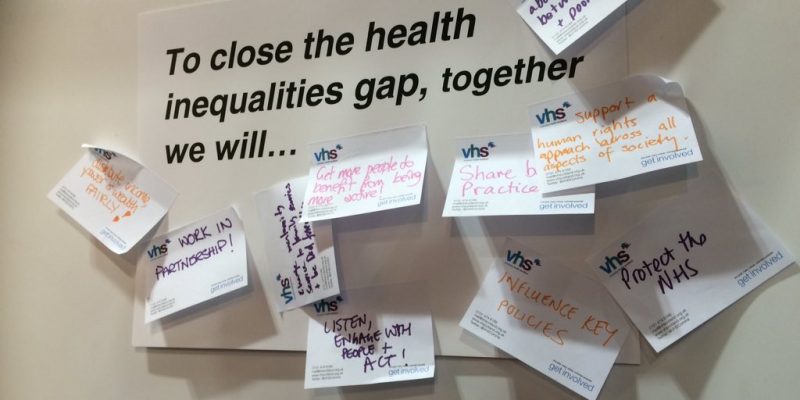
We all have a part to play in tackling the deep-rooted inequalities that have beset Scotland’s communities. However, it is the third sector’s established and trusted relationships within these communities and its understanding of the lived experience of health inequalities that makes its contribution essential.
“Quite bluntly, we need you. Not only because we need to learn from what you have, but also because you are going to be delivering services, if you are not already,” Pam Duncan-Glancy, Senior Communications and Engagement Officer, NHS Health Scotland told a joint workshop that was hosted by NHS Health Scotland and VHS at The Gathering last week.
“You are working on the frontline every day. You are working with people who know what that lived experience is every single day. We also know that you are excellent at influencing policy and practice and that is something where we need to work together. The public sector probably needs to get a bit better at learning how we can do that with you. And we need to know more about some of the service barriers that get in your way.”
Many of these issues are outlined in VHS’s Living in the Gap report which examined the issue of health inequalities through the lens of the third sector. The sector understands health inequalities, Chief Officer Claire Stevens observed, and continues to work hard to prevent and mitigate the impact of these. However, it also recognises the need to work collaboratively with others in order to close the gap, and so VHS has been working with its members and across its networks to do just that.
The joint workshop Delivering a Fairer Healthier Scotland was one such opportunity to explore the third sector’s continuing contribution. NHS Health Scotland’s current strategy, which runs until March 2017, set out its vision for a Scotland where all people and communities have a fair share of opportunities, resources and confidence to live longer, healthier lives. Now looking ahead to its next strategy, Mark McAllister, Organisational Lead for Strategic Development at NHS Health Scotland, told those gathered that the special health board wants to reach out to the third sector first, in opening its discussions about what its next strategy should look like.
“This is the first part of that engagement. The first engagement session we’ve actually had. So we are very keen to see what comes out of this,” he said.
“Where should we be focusing our capacity and expertise? But, equally, what contribution can others make to tackling inequalities?”
While 20 minutes is not a long time to put the world to rights and conclusively answer how we are going to create a fairer, healthier Scotland, those attending the workshop got the conversation off to a good start. Positive examples were shared of unlikely partnerships formed between organisations where common ground was identified, and enthusiasm was expressed for further help to broker more successful partnerships. Improving health across all social determinants by adopting a human rights-based approach was also a shared ambition, while the instability of funding models remains a collective concern and barrier to success.
But this was just the beginning of a wider conversation that NHS Health Scotland is keen to continue over the coming months. So make it your business to speak up and help turn the knowledge of the experienced third sector into positive action to reduce health inequalities and improve health.
View the Twitter Storify from this event here.
Katie Macintosh is a freelance writer and communications specialist with an interest in health issues.
